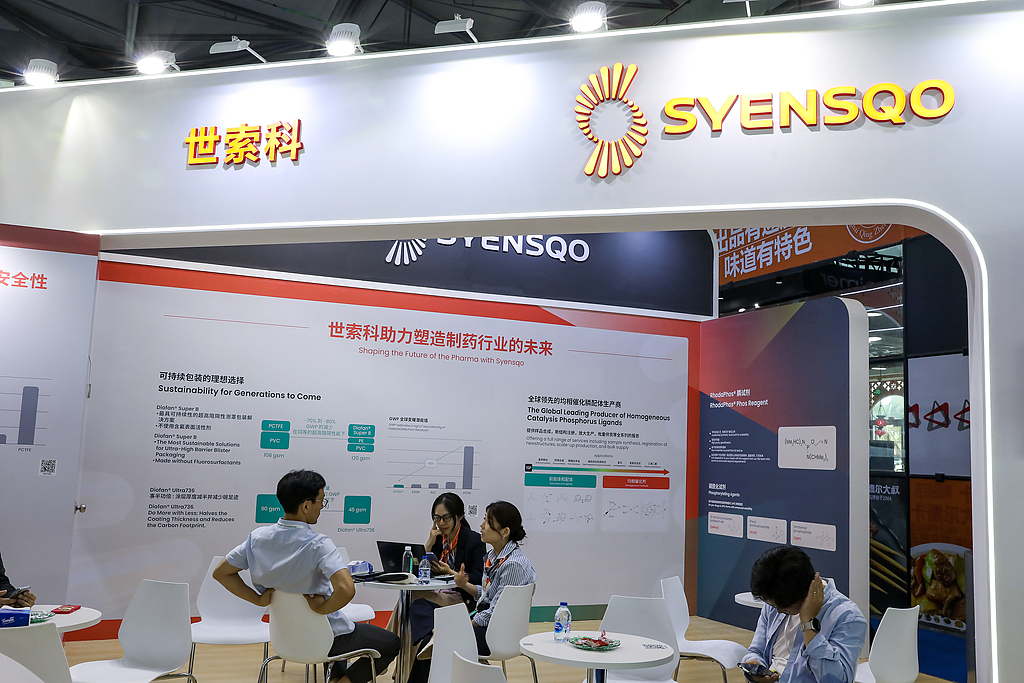Syensqo bullish about specialty chemicals biz


Global specialty chemicals company Syensqo remains committed to investing in China, and is optimistic about its long-term economic prospects, its top executive said.
"Syensqo aims to double our performance in China to meet the high and increasingly sophisticated demand in the country, the world's largest chemical market," said Ilham Kadri, CEO of Syensqo, on the sidelines of the Summer Davos meeting held in Tianjin last week.
Kadri highlighted China's crucial role in the global chemical industry, which she said accounts for half of global output while supporting sectors from lightweight materials and electrification to connectivity and biotechnology.
"China is a great market for Syensqo and for the chemical industry in general," Kadri said.
"China is around 15 percent of our business today and I still believe we need to double in China, because there is high demand and the demand China needs from the specialties is becoming more sophisticated and more sustainable."
Syensqo, which emerged as a standalone company in late 2023 following a demerger from Solvay, has been present in China since the 1980s.
Kadri emphasized the company's strategy of "China for China", mirroring approaches for other major regions like the United States and Europe, to build resilient and cost-effective value chains closer to customers.
To support this strategy, Syensqo recently established a headquarters in Shanghai. The company also continues to invest in production capacity, having recently doubled its compounding capacity in Changshu, under Suzhou, Jiangsu province.
Kadri acknowledged short-term challenges facing the global industry, including volatility, tariffs, and geopolitical events impacting trade and shipments. However, she expressed strong optimism about the medium and long term, believing that crises bring opportunities and learning.
"I truly believe it is short term," she said of the current volatility.
"I'm very optimistic about the Chinese market, considering the increasing sophistication of demand in China driven by local industry champions and a growing middle-income group seeking high-value, sustainable products and solutions in areas like clean mobility (electric vehicles), personal care, and home care."
Kadri also sees significant opportunity in partnering with Chinese original equipment manufacturers (OEMs) and industry players as they expand globally, particularly into Europe.
Syensqo can leverage its existing production infrastructure and knowledge of regulatory frameworks in those regions to support Chinese companies establishing operations abroad, she said.
The company signed a Strategic Partnership Framework Agreement with China Petroleum & Chemical Corporation (Sinopec) in April to foster collaboration in advanced materials and specialty chemicals in various sectors, including commercial aerospace, transportation, energy, electronics, and industrial fields.
The collaboration will also delve into supply chain management and sustainability initiatives, including the use of circular chemicals and reducing carbon footprints, it said.
China Petroleum and Chemical Industry Federation (CPCIF) has forecast that China's petrochemical sector is expected to bolster its profits this year, a key turning point after a period of challenges.
China's petrochemical sector has overcome its downturn, achieving stabilization in 2024 and is now showing signs of recovery, said Fu Xiangsheng, vice-president of the federation.
Data released by the federation reveal that the country's petrochemical sector's revenue rose to 16.28 trillion yuan ($2.27 trillion) last year, up 2.1 percent year-on-year, amid an intricate landscape.
"China moved from maybe imitation 30 years ago to innovations," Kadri noted, adding that other regions are now asking Chinese players to onshore their disruptive technologies. "We see it as a big opportunity to support Chinese transplants."
Kadri said she is confident of the broader foreign business environment in China, since the country has been opening-up and introducing new measures to bolster its reforms.
Syensqo invests where a clear business case exists, driven by real market demand and the ability to operate in a "friendly ecosystem "that protects investments, including intellectual property and assets, she said.
Kadri, who co-chaired this year's Summer Davos, said the meeting was a timely and critical platform for dialogue on creating "new champions" in a changing world through collaboration and constructive curiosity.
She expressed high expectations for engaging with Chinese authorities and industry leaders to discuss China's vision and find solutions to shared challenges.




































